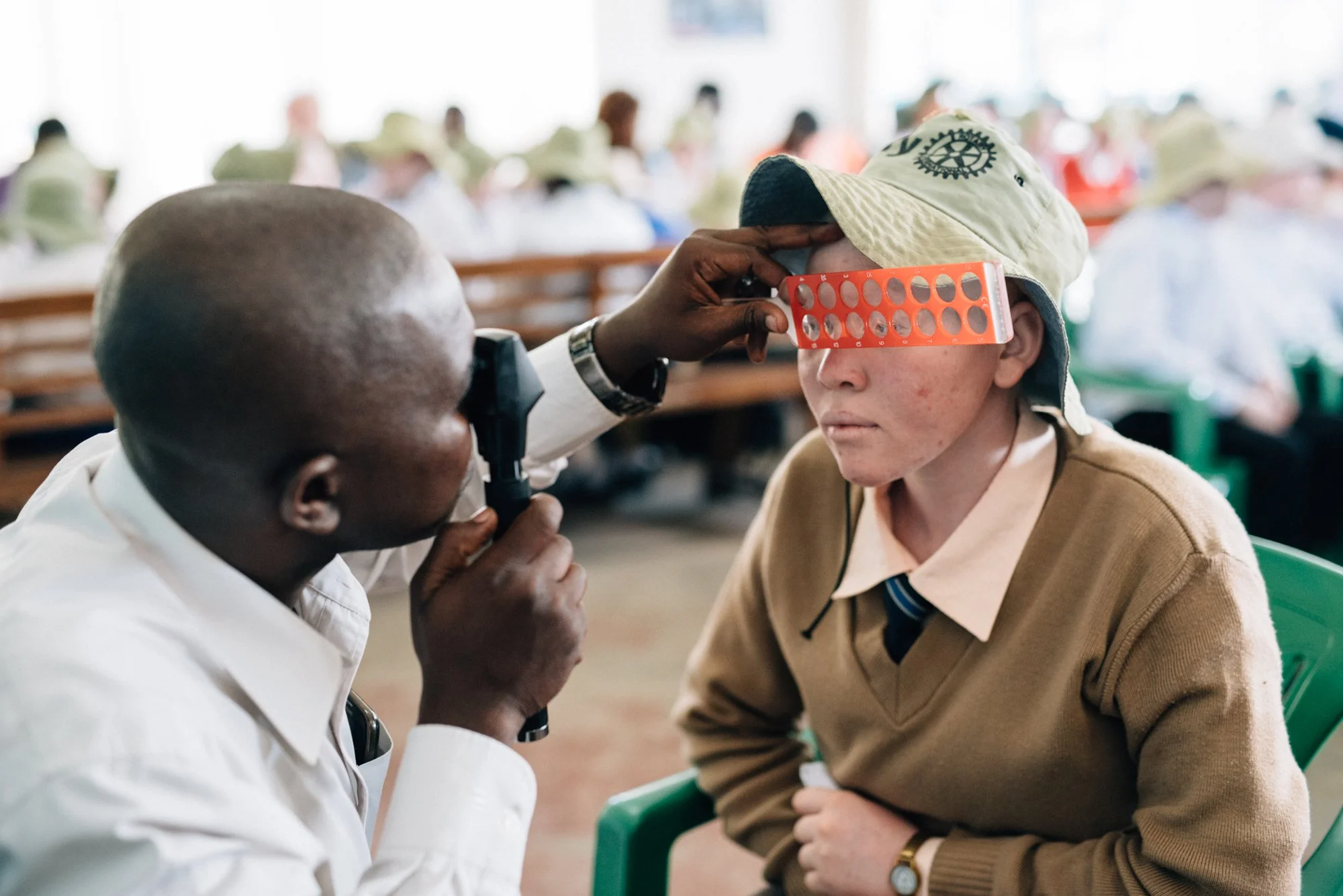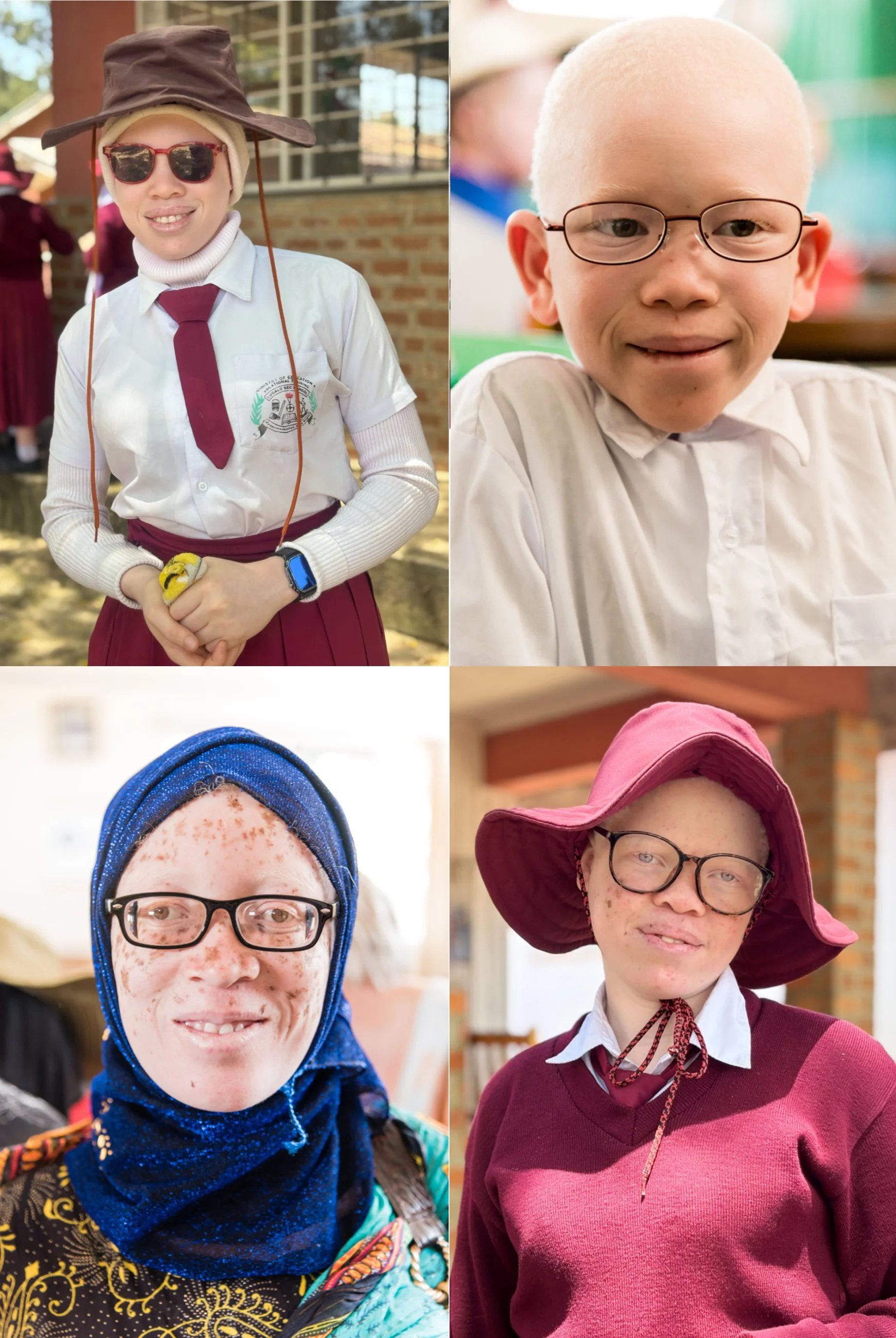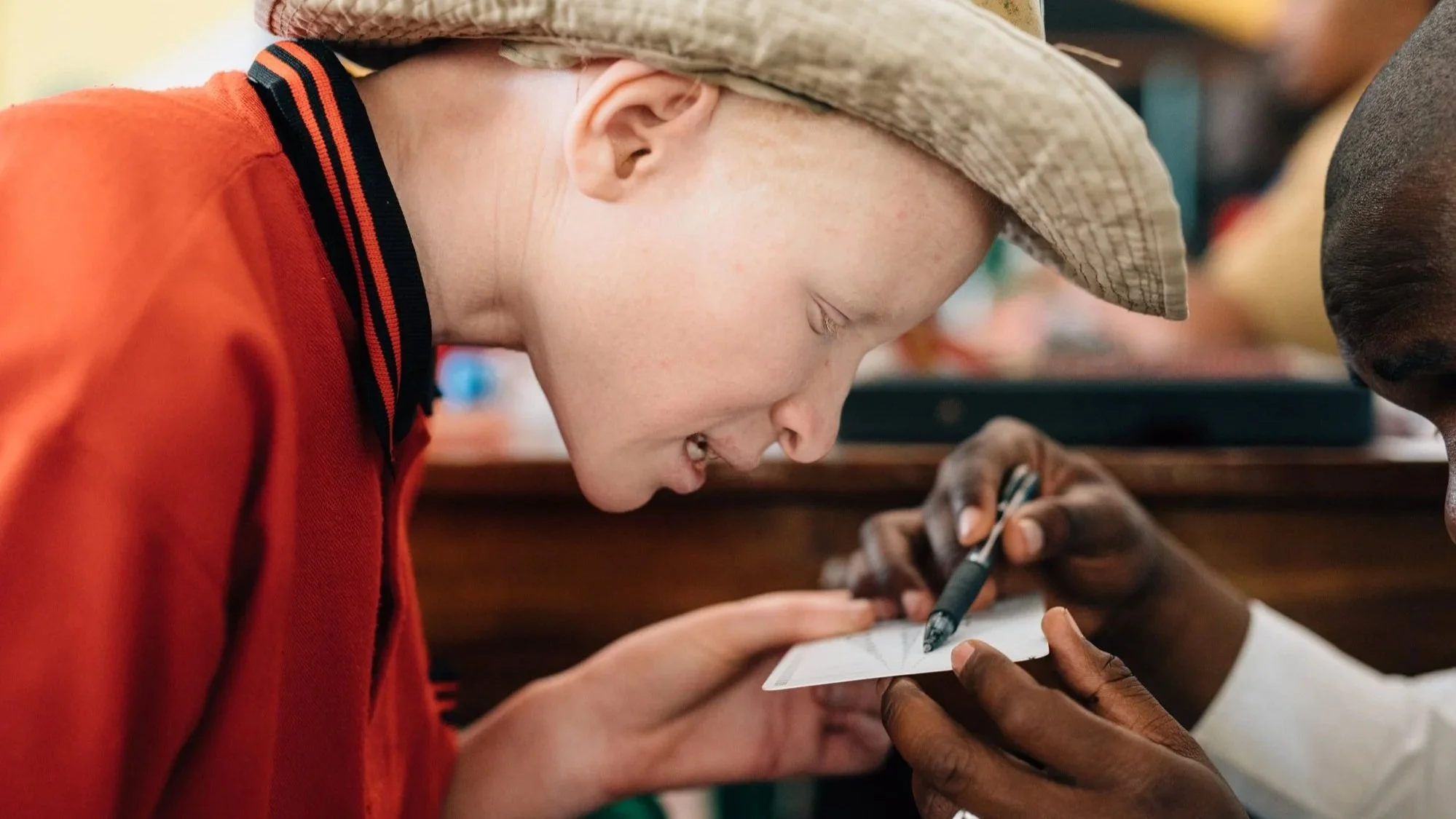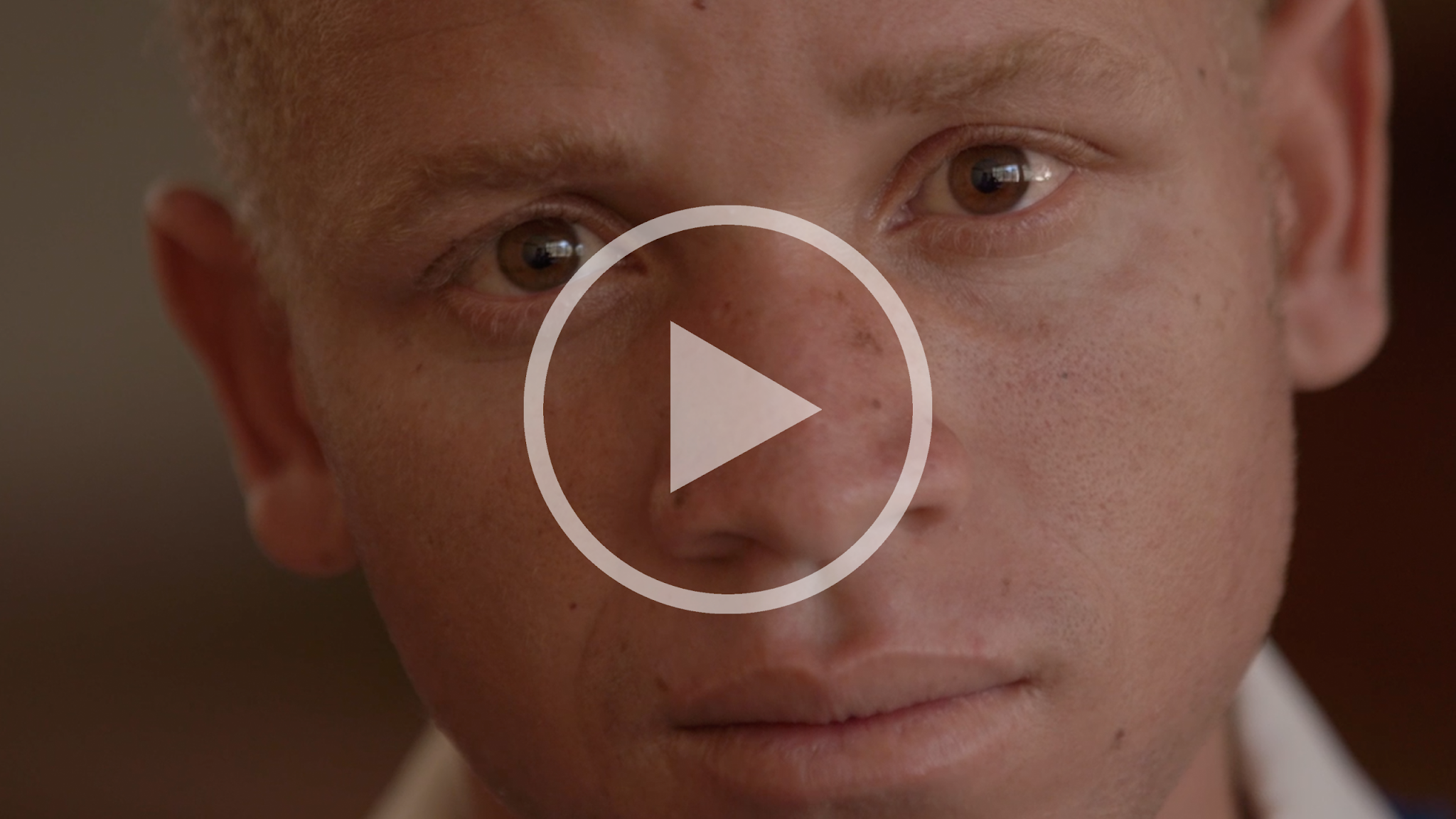VISION

Overview
People with albinism are visually impaired as a result of their melanin deficiency. Untreated, visual impairment can undermine educational outcomes and restrict professional opportunities for people with albinism, damaging their economic security and forcing many into outdoor labour as subsistence farmers, where the risk of skin cancer is dangerously high. In Tanzania and Malawi, poor optometry services and systemic discrimination mean most people with albinism do not access the vision care and education they need. Most teachers are not trained to understand or manage the visual impairment of students with albinism in school.
In 2014, Standing Voice developed a clinical service of care, education, and training to improve access vision services for people with albinism and strengthen the skills of optometrists and teachers in Africa. Focusing mainly on students, the programme delivers large-scale eye clinics that provide specialist low vision examinations, assistive devices, educational sessions and resources.
The Vision Programme is conducted in close partnership with the Government of Tanzania and Malawi and is made possible with the support of the Pierre Fabre Foundation, Inside the Same, Manuli Ryco, Mite Organisation, Deloitte, and EssilorLuxxito Foundation. To date over 5,000 people have been supported with essential low vision and educational support across Tanzania and Malawi.
How It Works
To bridge the gap between poor eyesight and poor learning, the Vision and Education Programme (VEP) brings eye care directly to students, ensuring they receive early interventions that support their education and future opportunities. Clinics are held in schools or community spaces, where we also train teachers as ‘Vision Ambassaors’ to meet students’ unique needs.
Through close partnerships, we have built a sustainable and scalable framework for vision care in low-resource settings, ensuring people with albinism receive the support they need, now and in the future.
Comprehensive Vision Care
Each eye clinic, delivered by trained local optometrists, provides:
Specialist eye examinations tailored to the needs of people with albinism
Assistive devices, such as prescription glasses, Magnifiers, Monocular telescopes, UV protective sunglasses.
Educational resources and guidance on low vision and use of assistive devices for students.
Following clinics, we monitor student progress, provide follow-up care, and ensure students continue receiving the support they need to thrive.
The VEP is powered by an extensive network of partnerships, ensuring long-term, scalable impact:
-
We work in close partnership with associations of persons with albinism to map communities, identify areas of greatest need, and mobilise individuals to access vital vision and education support.
-
We mobilise and establish networks of optometrists through partnerships with Optometric Associations and training institutes, strengthening their capacity and skills in diagnosing and treating low vision in people with albinism.
-
We work closely with schools that nominate teachers for training and collaborate with us to develop tailored action plans that enhance learning environments, ensuring children with albinism receive the support they need to thrive. These schools also host Understanding Albinism Seminars and help facilitate students’ access to our clinical services.
-
We train teachers to become Ambassadors for the educational needs of students with albinism, empowering them to promote inclusion and create environments where students can thrive. Vision Ambassadors track student progress, report on the impact of assistive devices on learning outcomes, and request replacements when needed. They also lead peer-to-peer training for fellow teachers, fostering more supportive and informed school communities.
-
We collaborate with leading eye care specialists working on albinism around the world to uphold the highest standards of clinical care, training, and mentorship. These experts play a vital role in advancing research and in shaping a sustainable, long-term model of care for people with albinism in Africa.
-
We collaborate with Special Education departments and offices to reach schools supporting students with albinism, advocating for improvements in disability inclusion policies and teacher training curricula.
-
Gilbert Henry - Mara Region
“Having glasses that fit my specific needs is like a whole new world to me. I can see colours more vividly, navigate my surroundings with ease, and even participate in sports confidently. This program has truly changed my life”
Gaston Mcheka - Dar es salaam
“The support and guidance from the doctors have been invaluable. They have helped me understand my vision challenges and provide me with the devices and knowledge I need to thrive. I finally feel empowered to reach my full potential”.
Aichi Ngure - Pwani Region
“Before the program, I struggled to see the words on the computer and read the text in newspapers. Now with my new glasses I can finally keep up with my colleagues. It’s made a big difference to both my confidence and school work”.
Dr Abdi Nyembo, Assistant Director Vision Services
“I'm so proud of the work we are doing to train Optometrists as experts in low vision management for people with albinism. We’re providing both children and adults with the tools and knowledge they need to reach their full potential.”
In Focus: Vision Ambassadors
Empowering Educators to Transform Learning
Beyond improving access to direct eye care, the Vision and Education Programme (VEP) drives systemic change by training teachers to support students with albinism. By equipping educators with the knowledge and skills to accommodate visual impairment, we are empowering the next generation to thrive academically and professionally, breaking the cycle of stigma, promoting inclusion, and building opportunities for children to thrive.
The Role of a Vision Ambassador
Each participating school selects teachers to be trained as Vision Ambassadors for students with albinism. These teachers become champions for inclusion, ensuring that students with albinism receive the support they need to succeed.
-
Vision Ambassadors are responsibility for students’ well-being and ensuring that students with albinism have equitable access to education and the necessary accommodations.
-
Vision Ambassadors are responsible for spreading knowledge by conducting peer-to-peer training for fellow teachers on inclusive teaching strategies for students with albinism.
-
Vision Ambassadors are trained to manage the proper use, care, and maintenance of assistive vision devices.
-
Vision Ambassadors monitor and report on student well-being and progress due to vision support, coordinating follow-up care as needed.
To date, hundreds of teachers across Tanzania have been trained, creating a sustainable network of support within schools. By embedding knowledge and advocacy at the heart of education systems, we are fostering long-term, systemic change, ensuring that students with albinism are no longer left behind.
-
Maulid Lijaa, Mkolani secondary school
“I have seen a big improvement in my students' ability to participate in class. They can now see the board more clearly and read textbooks more comfortably without straining their eyes. This has led to a boost in their confidence and academic performance”.
Juma Ally, Buhongwa secondary school
“The program has provided essential support for my students with albinism. Specialised low vision devices have empowered them to be more independent learners, and they're no longer falling behind in class due to vision impairment”.
Angela Ng’ambi, Hombolo primary school
“It's truly rewarding to see how the vision program has transformed the lives of my students with albinism. They are more engaged in learning, making new friends, and participating in activities that they previously couldn't due to vision challenges”.
Useful Resources
Albinism Booklet for Teachers
Our purpose-built guide for teachers on how to support students with albinism
Case Study
Short caption
Information booklet for PWA, Families and Caregivers
Our purpose-built guide to increase knowledge on albinism

With special thanks to our programme partners







































